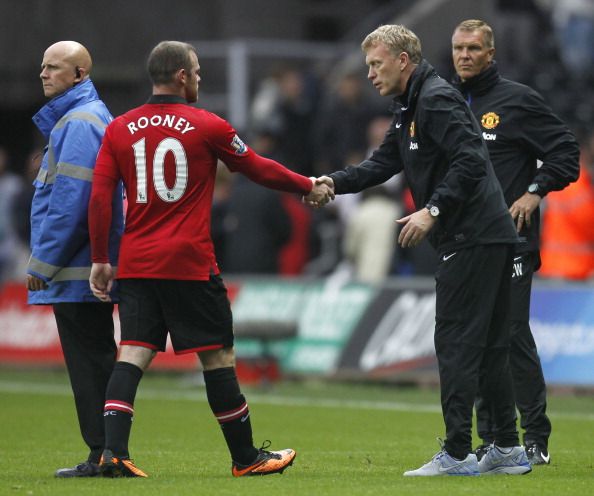
Constructing a transfer story: How the press do it

David Moyes (R) with Wayne Rooney
Manchester United versus Chelsea is so much more than just a football game. On Monday night, it was not just about David Moyes’ first game at Old Trafford, it wasn’t only about the first blockbuster game of the season, it did not solely centre around Jose Mourinho’s return to England.
Because it is the transfer season, much of the build-up to that game, a lot of what was said at half time in TV studios throughout the world and a large amount of post-match press was dedicated to the situation surrounding Wayne Rooney, who was the best player on the pitch during that yawning draw between the Premier League heavyweights.
The reason the press have focused their attentions on Rooney is because they know that he sells, and by joining the Wayne Rooney transfer bandwagon, they are bound to get reads that number in tens of thousands for newspapers, and truth be told, they need those readers.
This is an era where newspapers are becoming increasingly digitised, and most of the news one reads on the internet these days is free, which in turn means that papers lose out on sales that they would receive if people bought them from news stands or subscribed to them. Why would you want to buy a copy of a paper if you could get your news for free and access it from any location that has access to the internet (which is practically everywhere)?
By focusing on Rooney, what the papers are doing is tapping into a reservoir of emotion that is as vast as it is deep because of the number of people who support Manchester United throughout the world. That means that an article on the England striker would potentially be read by millions of people throughout the world.
Link him to Arsenal and you have another set of millions who could potentially read that article. Throw in Chelsea and you have another million or so, even if they’ve been allocated only a footnote.
The emotions, of course, are of a myriad number. The transfer market is seen as a time when football fans check the net every few minutes in quiet desperation in the hope of seeing new faces at clubs they support, with the amount of desperation varying from indifferent if your favoured team is Bayern Munich (for example), to pointed (because Chelsea only need a world-class striker) to one that borders on the hysterical if you are an Arsenal fan (for they have been selling their best players for years and are in need of reinforcements on the back of an eight-year trophy-less run).
Manchester United supporters are in some confusion as to whether David Moyes is the right man to lead the club and while a few of the fans who would’ve thrown their weight behind United only did so because they were winning, the core of United’s supporter base would have liked to see a few high-profile signings come in this summer.
That, however, has not materialised, in part because Moyes does not carry the same pedigree that Sir Alex Ferguson once did, and players that have been approached by United (if you believe the papers) would be somewhat apprehensive of playing under a manager who is yet to prove his credentials at the highest level with the World Cup just around the corner.
The press, of course, would want to play up United’s ability to continue to attract the best players so that there is an impression of a vacuum that is at least partially filled following the departure of Sir Alex.
It is common knowledge that Arsenal are on the lookout for world-class talent and the papers, knowing this, capitalise on the frenzied hopes of their fans by linking them to a host of players. This season, Gonzalo Higuain, Luis Suarez, Wayne Rooney, former Gunner Cesc Fabregas and fellow Spaniard Iker Casillas have all been the subject of hypothetical paths extrapolated to North London.
The reason this is done is to (at least temporarily) pacify the fans and reassure them that someone is indeed coming, thereby leading to several actions taking place.
The first is an attempt by papers to spark a bidding war and further unsettle a player who wants to leave a club, or unsettle a player who until that point was previously comfortable in his surroundings. The second is to play up the spending power of a club despite someone new managers coming in at the helm.